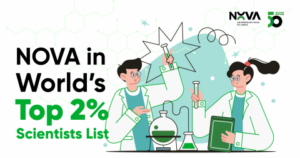NOVA is growing not only in the list that counts citations over the course of a career, but also in the list for the last year. And on both lists there are researchers from practically all of NOVA’s schools.
Stanford University has just released an update of its prestigious “World’s Top 2% Scientists Ranking,” compiled based on Scopus – the reference database of abstracts and citations of articles for journals and other academic publications, which covers around 19,500 records from more than 5,000 international publishers.
It is a list that highlights the 2% most cited researchers globally in 22 scientific areas and 174 sub-areas, considering the influence and impact of academic research.
The update, which includes two distinct categories – career and last year (2022) – reflects the university’s commitment to providing more accurate standardized citation metrics, thus combating possible abuses of self-citation.
The career list now released includes a total of 47 NOVA researchers, consolidating the growth already registered in last year’s list, which included 44 NOVA researchers.
This elite group represents 8.2% of the national total of 572 outstanding researchers.
In the category that highlights citations from the last year (2022), NOVA continues to impress, with a total of 63 researchers, compared to 61 last year. This group represents 8% of the national total of 791 outstanding researchers.
This consolidates an improvement in results compared to the previous edition, with a total of 78 unique researchers highlighted (with 32 names appearing on both lists) from NOVA’s various organic units.
GHTM-IHMT-NOVA researchers on this year’s list
Anne Mieke Vandamme
Carla Maia
Jacques Derek Charlwood
Thierry Mertens
Carla Maia reacted to the news mentioning “I feel very honored to once again be part of the list of the most cited scientists in the world in 2022. Thank you to all national and international colleagues for your collaboration over the years and to the funded agencies for supporting the work carried out”, concluded the Assistant Researcher and VBD-GHTM member.
See the full list of researchers from all of NOVA’s Organic Units who are part of the 2%.
